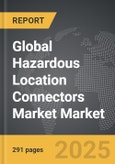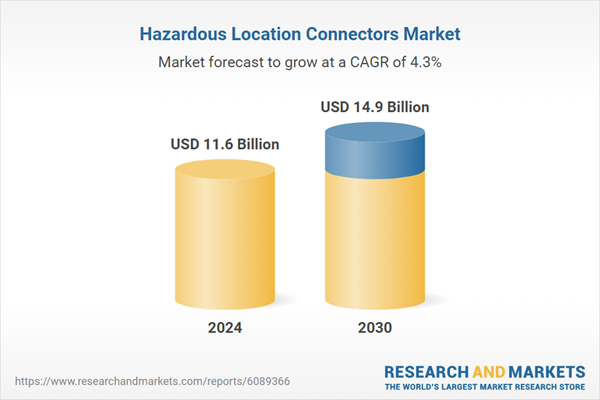Global Hazardous Location Connectors Market - Key Trends & Drivers Summarized
Why Are Hazardous Location Connectors Vital to Industrial Safety and Infrastructure?
Hazardous location connectors are specialized electrical connectors designed to operate safely in environments with flammable gases, combustible dust, or explosive atmospheres. These connectors are critical components in sectors such as oil & gas, mining, petrochemicals, chemical processing, and aerospace - where electrical sparks or equipment failures can trigger catastrophic incidents. Their primary role is to maintain sealed, secure electrical connections that prevent ignition sources from interacting with hazardous external conditions.Compliance with global safety standards such as ATEX (Europe), IECEx (international), and NEC Class/Division codes (North America) further emphasizes the importance of these components in regulatory-compliant industrial design. Whether used in junction boxes, control panels, or instrumentation networks, hazardous location connectors ensure operational continuity and personnel safety in volatile environments. Their deployment supports mission-critical systems like lighting, surveillance, and automation, making them essential to risk mitigation strategies in high-stakes industrial applications.
How Are Engineering Advancements Enhancing Connector Performance?
Technological innovation in hazardous location connectors is focused on improving environmental sealing, corrosion resistance, and long-term durability. Materials such as stainless steel, brass alloys, and high-grade thermoplastics are being increasingly used to withstand extreme temperatures, chemical exposure, and vibration. Enhanced ingress protection (IP67 and above) and explosion-proof housing designs ensure the connectors meet stringent environmental performance requirements, even in offshore or desert installations.Manufacturers are also introducing modular and quick-connect systems that simplify installation and maintenance, reducing labor costs and minimizing downtime in hazardous zones. Newer models integrate features like signal and power separation, advanced grounding mechanisms, and locking indicators to boost functionality and user safety. Additionally, smart monitoring capabilities are being embedded to enable real-time diagnostics, fault detection, and predictive maintenance through industrial IoT frameworks. These advancements are transforming traditional connectors into intelligent infrastructure components.
Which Industries and Regions Are Leading in Connector Deployment?
The oil & gas industry remains the largest user of hazardous location connectors, given its reliance on equipment that must function reliably in high-risk offshore platforms, drilling sites, and refineries. Chemical plants, pharmaceutical manufacturing, and food processing facilities are also expanding their adoption due to stringent hygiene and explosion-prevention protocols. Renewable energy sites, including biogas and hydrogen production facilities, are emerging as new application areas as the energy transition accelerates globally.Regionally, North America leads in deployment volume due to its well-established oil & gas sector and early adoption of safety standards. Europe follows closely, driven by strict regulatory frameworks and demand for industrial automation. Asia-Pacific is witnessing rapid growth, particularly in China, India, and Southeast Asia, where infrastructure expansion and safety upgrades in manufacturing are boosting demand. As global industrialization continues, emerging markets in Latin America, the Middle East, and Africa are also seeing increasing investment in certified explosion-proof electrical systems.
The Growth in the Hazardous Location Connectors Market Is Driven by Several Factors
The growth in the hazardous location connectors market is driven by escalating industrial safety requirements, expanding energy infrastructure, and tightening global regulatory standards. As industries digitize and automate hazardous operations, the need for durable, compliant, and reliable electrical connectivity in explosive environments becomes paramount. The rise of industrial IoT and condition-based monitoring is driving demand for connectors that offer not just physical protection, but also integrated sensing and diagnostic functions.Sector-specific dynamics such as the continued exploration of offshore oil & gas reserves, modernization of aging chemical plants, and the global push toward safer mining practices are all contributing to increased installations. Additionally, renewable energy projects that operate in challenging environments - such as hydrogen or biomass - are adding new growth avenues. The integration of advanced materials, smart locking mechanisms, and modular assembly is further reducing risk and installation complexity, ensuring that hazardous location connectors remain central to the safety and efficiency of critical infrastructure worldwide.
Report Scope
The report analyzes the Hazardous Location Connectors market, presented in terms of market value (US$). The analysis covers the key segments and geographic regions outlined below:- Segments: Product Type (Cable Glands, Cable Connectors, Conduit Fittings); Application (Food & Beverage Processing, Oil & Gas Production, Pharmaceutical Manufacturing, Wastewater Treatment Facilities, Power Generation, Marine, Other Applications).
- Geographic Regions/Countries: World; United States; Canada; Japan; China; Europe (France; Germany; Italy; United Kingdom; Spain; Russia; and Rest of Europe); Asia-Pacific (Australia; India; South Korea; and Rest of Asia-Pacific); Latin America (Argentina; Brazil; Mexico; and Rest of Latin America); Middle East (Iran; Israel; Saudi Arabia; United Arab Emirates; and Rest of Middle East); and Africa.
Key Insights:
- Market Growth: Understand the significant growth trajectory of the Cable Glands segment, which is expected to reach US$8.8 Billion by 2030 with a CAGR of a 3.7%. The Cable Connectors segment is also set to grow at 4.9% CAGR over the analysis period.
- Regional Analysis: Gain insights into the U.S. market, valued at $3.2 Billion in 2024, and China, forecasted to grow at an impressive 6.7% CAGR to reach $2.9 Billion by 2030. Discover growth trends in other key regions, including Japan, Canada, Germany, and the Asia-Pacific.
Why You Should Buy This Report:
- Detailed Market Analysis: Access a thorough analysis of the Global Hazardous Location Connectors Market, covering all major geographic regions and market segments.
- Competitive Insights: Get an overview of the competitive landscape, including the market presence of major players across different geographies.
- Future Trends and Drivers: Understand the key trends and drivers shaping the future of the Global Hazardous Location Connectors Market.
- Actionable Insights: Benefit from actionable insights that can help you identify new revenue opportunities and make strategic business decisions.
Key Questions Answered:
- How is the Global Hazardous Location Connectors Market expected to evolve by 2030?
- What are the main drivers and restraints affecting the market?
- Which market segments will grow the most over the forecast period?
- How will market shares for different regions and segments change by 2030?
- Who are the leading players in the market, and what are their prospects?
Report Features:
- Comprehensive Market Data: Independent analysis of annual sales and market forecasts in US$ Million from 2024 to 2030.
- In-Depth Regional Analysis: Detailed insights into key markets, including the U.S., China, Japan, Canada, Europe, Asia-Pacific, Latin America, Middle East, and Africa.
- Company Profiles: Coverage of players such as Anheuser-Busch InBev, Barefoot (E. & J. Gallo Winery), Bon V!V Spiked Seltzer, Bud Light Seltzer, Carlsberg Group and more.
- Complimentary Updates: Receive free report updates for one year to keep you informed of the latest market developments.
Some of the 42 companies featured in this Hazardous Location Connectors market report include:
- ABB Ltd.
- American Connectors Inc.
- Amphenol Industrial Products Group
- Appleton Group LLC (Emerson)
- Atkore Inc.
- Bartec Group
- Bulgin Ltd.
- Cavotec SA
- Cooper Crouse-Hinds (Eaton)
- Elcom International Pvt. Ltd.
- Emerson Electric Co.
- Fischer Connectors
- HARTING Technology Group
- Hubbell Inc.
- ITT BIW Connector Systems
- Lapp Group
- Molex LLC
- Pepperl+Fuchs SE
- R. STAHL AG
- TE Connectivity Ltd.
This edition integrates the latest global trade and economic shifts into comprehensive market analysis. Key updates include:
- Tariff and Trade Impact: Insights into global tariff negotiations across 180+ countries, with analysis of supply chain turbulence, sourcing disruptions, and geographic realignment. Special focus on 2025 as a pivotal year for trade tensions, including updated perspectives on the Trump-era tariffs.
- Adjusted Forecasts and Analytics: Revised global and regional market forecasts through 2030, incorporating tariff effects, economic uncertainty, and structural changes in globalization. Includes historical analysis from 2015 to 2023.
- Strategic Market Dynamics: Evaluation of revised market prospects, regional outlooks, and key economic indicators such as population and urbanization trends.
- Innovation & Technology Trends: Latest developments in product and process innovation, emerging technologies, and key industry drivers shaping the competitive landscape.
- Competitive Intelligence: Updated global market share estimates for 2025, competitive positioning of major players (Strong/Active/Niche/Trivial), and refined focus on leading global brands and core players.
- Expert Insight & Commentary: Strategic analysis from economists, trade experts, and domain specialists to contextualize market shifts and identify emerging opportunities.
Table of Contents
Companies Mentioned (Partial List)
A selection of companies mentioned in this report includes, but is not limited to:
- ABB Ltd.
- American Connectors Inc.
- Amphenol Industrial Products Group
- Appleton Group LLC (Emerson)
- Atkore Inc.
- Bartec Group
- Bulgin Ltd.
- Cavotec SA
- Cooper Crouse-Hinds (Eaton)
- Elcom International Pvt. Ltd.
- Emerson Electric Co.
- Fischer Connectors
- HARTING Technology Group
- Hubbell Inc.
- ITT BIW Connector Systems
- Lapp Group
- Molex LLC
- Pepperl+Fuchs SE
- R. STAHL AG
- TE Connectivity Ltd.
Table Information
| Report Attribute | Details |
|---|---|
| No. of Pages | 291 |
| Published | February 2026 |
| Forecast Period | 2024 - 2030 |
| Estimated Market Value ( USD | $ 11.6 Billion |
| Forecasted Market Value ( USD | $ 14.9 Billion |
| Compound Annual Growth Rate | 4.3% |
| Regions Covered | Global |









